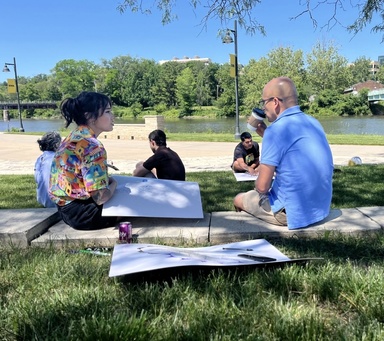For third-year English doctoral student Thelma Trujillo, the graduate student experience at the University of Iowa has helped her rethink what it means to be a scholar. As a first-generation student, Trujillo has struggled to navigate academia. During her master’s program, she found herself overwhelmed and stressed to the point of triggering a Shingles outbreak. After two years at Iowa, things weren’t necessarily any better: remotely completing graduate coursework in a new place during a pandemic was, as she recalls, “very isolating.”

Luckily, Trujillo has since found her niche, in part aided by two workshops she completed during summer 2022. The first, the University of Iowa’s Imagining Latinidades Mellon Sawyer Seminar, gathered 10 faculty and graduate students in Latina/x/o studies at the Obermann Center for Advanced Studies and featured activities ranging from guided writing sessions to meditation.
As faculty workshop co-leader Dr. Naomi Greyser recalled, Thelma “asked some really important questions about how (a colonial Mexican ink drawing entitled Sermones Aestivales) got to this university, as well as its deeper history and what it could and could not tell us.” Trujillo explained that even though her workshop project was not directly related to her field—and that “I didn’t end up with any answers, I had more questions than anything” by the project’s conclusion—Imagining Latinidades offered her the space to rethink and reset her sense of purpose as a scholar, and to experience “academic joy.”

Dr. Greyser also shared how Trujillo started opening up over the course of the seminar, and Trujillo too identified it as a seminar highlight. “I think the most important thing I took away from (Imagining Latinidades) was being able to negotiate my role as a researcher and a storyteller and really think about how my personal identities and my more embodied components come into play in my scholarship,” she said.
As her scholarship explores questions about how, as she explained it, early English religious texts “negotiate the tension between particularity—such as geographical location, skin color, race—and universality, or this overarching umbrella of Christianity that is present in so many medieval texts,” there is obvious spatial and temporal distancing for a Latina scholar in 21st-century Iowa performing this research.
However, for Trujillo, that distancing has offered perspective, which could offer a way for her to help reimagine the medieval studies field. Most recently focusing her attention on Saint Mary of Egypt, Trujillo has traced a “whitewashing of the saint at the expense of emphasizing holiness” that she sees at play with additional saints from Egypt, Ethiopia, and other countries in the region. She has consequently started to interrogate how “race functioned in a precolonial England and how this project could also be in dialogue and in collaboration with postcolonial studies.”
As she explained, “I’m hoping that my research will allow us to understand medieval history and culture in a very nuanced way that hopefully paves the way for a more sustainable and equitable field of medieval studies.”
Looking forward, Trujillo imagines a “rebuilt” medieval studies field that endeavors to “make up for the whitewashing of early English history.” She hopes that her research is not contained to “some electronic abyss” but rather made available to the public and to scholars across multiple disciplines to further its potential impact.

In addition to Imagining Latinidades, Trujillo completed a six-week summer research program hosted by the Medieval Academy of America (MAA). The workshop is intended to expose doctoral students in medieval studies to various career paths and for members of Trujillo’s five-person cohort, it included assistance in developing grant proposals. The workshop provided her with dedicated space to explore potential avenues for larger research projects and to clarify what truly interests her within the medieval studies field, which will undoubtedly prove useful as she moves toward the dissertation-writing stage of her doctoral program.
Trujillo made an impression in the workshop, as Research Development Specialist Dr. Jennifer Speed observed. “Thelma was an ideal candidate for this inaugural program,” Dr. Speed shared. “She came to the program with clear ideas about her interests and scholarship but was open to considering new perspectives about her work through the lens of grantseeking. She was enthusiastic and supportive of her fellow scholars, and she has a great career ahead of her as a medievalist.”
Trujillo shared how, as with Imagining Latinidades, the MAA summer workshop also unexpectedly helped her reflect on her identity as an embodied researcher of color. In particular, she recalled how a guest speaker encouraged workshop attendees to be aware that some scholars of color “are sometimes too hurt to be able to help you” and clarified that community-building often requires building meaningful relationships and a deeper sense of belonging with people outside of one’s home department, two messages that Trujillo has taken to heart. “I feel like when I was researching for my master’s degree, I was kind of just following directions, following guidelines, doing what has been most publishable, as opposed to thinking about how to write myself into my research,” she said. “I really want to make sure that I’m writing for myself first and writing what brings me joy and what I find compelling, rather than trying to just publish or perish.”